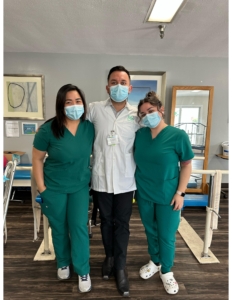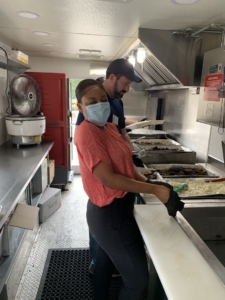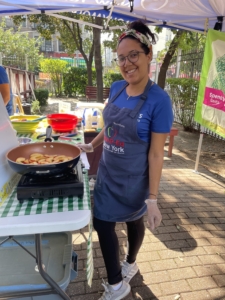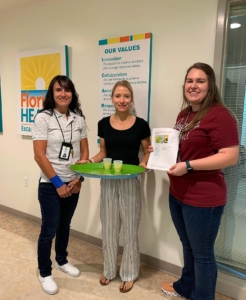Becoming a registered dietitian nutritionist (RDN) is a challenging yet rewarding journey combining education and hands-on training. One of the main components of the RD2Be journey is the dietetic internship. The Accreditation Council for Education in Nutrition and Dietetics (ACEND) has specific requirements to ensure all dietetic internships offer comprehensive and high-quality training.
What is ACEND?
ACEND is the official accrediting agency for dietetic education programs in the United States. Their mission is to ensure the quality of nutrition and dietetics education for registered dietitians and dietetic technicians. To maintain ACEND accreditation, dietetic internship programs must adhere to core competencies and performance standards.
Dietetic Internship Rotation Requirements
ACEND requires dietetic internship programs to align their training with core competencies covering essential areas of dietetics practice. These competencies are designed to ensure that interns develop the skills and knowledge necessary to function effectively in a variety of professional settings.
Per ACEND standards, dietetic interns are expected to complete a minimum of 1,000 supervised practice hours regardless of the internship program. These hours are divided among various rotations to expose interns to different aspects of dietetics practice.
Clinical

Frankie (Fall 2022 Cohort) at his clinical dietetic internship rotation
Interns must gain experience in assessing and managing the nutritional needs of individuals across various stages of life and health conditions. This includes developing care plans, monitoring progress, and adjusting interventions.
Interns spend a significant portion of their time in clinical settings, working directly with patients in hospitals, outpatient clinics, or long-term care facilities. These rotations focus on applying clinical nutrition knowledge in real-world scenarios.
Example clinical rotation sites include:
- Community or university hospitals
- Major medical centers
- Long-term care facilities
- Pediatric hospitals
- Outpatient clinics (cancer, cardiology, GI, etc.)
BWS DI interns may also complete a partial rotation at the following sites:
- Bariatric clinics
- Dialysis centers
- Inpatient or high acuity outpatient eating disorder programs

Briannah (Spring 2023 Cohort) at her foodservice dietetic internship rotation
Foodservice
This area covers the management of foodservice operations, including menu planning, procurement, quality assurance, and personnel management. Interns will learn to manage resources, follow food safety standards, oversee food production, and implement nutrition-related policies.
Example foodservice rotation sites include:
- School foodservice
- Hospital / medical center foodservice
- Long-term care / sub-acute clinical foodservice
- College / university dining services
- Catering or prepared meals companies with a nutrition focus
Community / Public Health

Jasmine (Spring 2023 Cohort) at her community dietetic internship rotation
Interns will engage with public health nutrition programs, learning to assess community needs, develop nutrition education programs, and implement strategies to improve community health outcomes. The goal is for interns to learn how to address nutrition issues at the community level. This may involve conducting nutritional assessments, developing educational materials, and evaluating program effectiveness.
Example community nutrition rotation sites include:
- WIC
- State, county, or local public health departments
- University cooperative extension programs
- SNAP-ed or EFNEP
- Food banks

Morgan (Fall 2021 Cohort) at her wellness dietetic internship rotation
Additional Rotations
Some programs may offer specialized rotations or elective opportunities in areas such as wellness, sports nutrition, research, or business just to name a few. These additional experiences allow interns to explore their areas of interest and gain expertise in niche areas of dietetics. Many BWS DI interns often use their elective rotation option to gain experience in eating disorders, sports nutrition, and private practice, amongst many others.
The Be Well Solutions Dietetic Internship program has a wellness rotation and some example sites include companies with established in-house wellness programs, universities providing wellness programming to staff and/or students, large fitness / athletic clubs, nutrition and wellness private/group practices serving corporate clients, and corporate wellness companies. BWS DI interns can also complete an optional elective rotation of their choice to explore any other area of the nutrition & dietetics profession!
Tips for Securing Rotation Sites
We know that securing rotation sites can be intimidating for some applicants and interns. If you’re in need of support, make sure to check out our Tips for Securing Rotations, Preceptor Toolkit, and FAQ section!
For more personalized support, please email bwsdi@bewellsolutions.com to connect with our Outreach Coordinator for rotation schedule assistance!
The ACEND requirements for dietetic internship rotations are designed to provide a well-rounded and rigorous training experience for future dietitians. By adhering to these standards, internship programs ensure that interns are equipped with the knowledge, skills, and practical experience needed to excel in the field of dietetics. For those aspiring to become registered dietitians, understanding these requirements is crucial in navigating the path to a successful career.
Ready to learn how to apply to BWS DI? Check out our page on how to apply, plus review the important dates for your intended application cycle. Don’t forget to sign up for DICAS!
